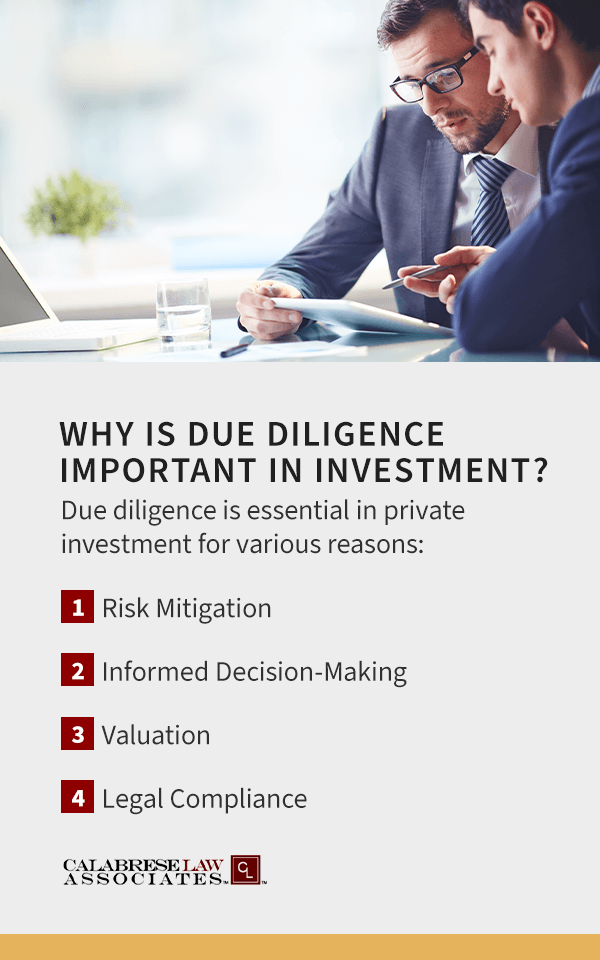Due diligence is crucial if you want to invest in a private business. It serves as the investigative backbone, helping you make informed decisions. Due diligence can save money by uncovering potential risks and providing further information about the opportunities. This guide discusses the various types of due diligence and their benefits. You’ll also learn about the due diligence process and strategies for optimizing the outcome.
What Is Investment Due Diligence?
Investment due diligence is the investigation a person undertakes to confirm relevant facts when considering an investment opportunity. In this context, a person refers to natural persons — humans — and artificial persons like corporate bodies. Thus, before any individual or business concludes an investment transaction, it’s vital to audit the opportunity and the people involved. The primary aim is to uncover potential risks and help investors make informed decisions.
Investment due diligence covers a wide range of business situations. Whether you are acquiring shares in a private company or giving out loans with interest or in exchange for returns, it’s essential to conduct due diligence. The scope of due diligence may also vary depending on the circumstances. It may also be performed at various stages of the investment process.
The key to successful due diligence is hiring an experienced professional with industry knowledge. The private investment attorneys at Calabrese Law Associates have performed due diligence on high-profile matters and can help you with your legal needs.
What Are the Types of Due Diligence in Private Equity Investment?
There are different types of due diligence, each serving a unique purpose. Here are the common examples:
1. Legal Due Diligence
Legal due diligence (LDD) covers various legal matters and is one of the most crucial assessments. You can conduct LDD to ascertain the people entitled to make decisions and ownership of business assets. LDD may also relate to areas like contractual obligations, litigation and potential liabilities, and regulatory compliance. Let’s dive deeper:
- Legal capacity: Depending on the business structure, only selected individuals may be authorized to make decisions or execute investment contracts on behalf of the company. If you negotiate and enter into an agreement with an unauthorized individual, the transaction could be void, subject to legal exceptions. LDD can protect you and help you avoid such situations.
- Ownership of assets: LDD can help you determine the legal status of assets the investee claims to own. For example, you can verify whether the company has title to or possession of the properties or their interest in the asset. This assessment applies to tangible assets like real estate and intangible assets like intellectual property.
- Contractual obligations: LDD ensures the investee is not bound by contracts that could adversely affect your investment. It also ensures the investment contract you sign aligns with your interests. This assessment can provide an added layer of protection.
- Lawsuits and potential liabilities: LDD can determine whether there are pending lawsuits against the investee. It can also help assess potential liabilities, saving you time and money.
- Regulatory compliance: There may be regulatory requirements depending on the nature of the business. Non-compliance could result in legal sanctions like fines or the revocation of licenses. LDD helps you avoid such pitfalls.
When investing in a company, you may need to consider multiple areas of LDD. A private investment attorney can help you navigate each component of LDD.
2. Commercial Due Diligence
Commercial due diligence focuses on the business’s commercial activities and growth potential. It evaluates operations within the company and industry trends. For example, you may conduct commercial due diligence to study the company’s market share and positioning. The information you gather gives you a broader perspective on sales forecasts and overall financial performance. Commercial due diligence may cover the following areas:
- Competitive landscape
- Customer base
- Supply chain efficiency
- Products and pricing
- Business model
3. Financial Due Diligence
Financial due diligence examines the company’s financial performance. It’s similar to commercial due diligence but focuses on the accuracy of financial information, such as:
- Income statements: These show the company’s income and expenditures. They focus on the revenue, gains, expenses, and losses within a particular period.
- Cash flow statements: These track the inflow and outflow of cash in the business within a specific period.
- Balance sheet: This details the company’s assets, liabilities, and capital within a specific period.
To succeed, you may evaluate financial records like bank statements, audits, and account payables. This evaluation helps demonstrate the company’s accounting practices. Financial due diligence also helps you estimate the company’s value and can reveal financial uncertainties and possible disruptions, saving you money.
4. Tax Diligence
Tax due diligence falls between financial and legal due diligence. It assesses the business’s tax obligations and whether it complies with them. It also helps determine the company’s efficiency regarding tax planning. Tax due diligence focuses on income and non-income tax areas, such as payroll, sales and use, and property taxes.
Other kinds of due diligence include:
- Management due diligence: This focuses on the company management team and organizational structure. The purpose is to learn more about the leadership and how they perform.
- Technological and IT due diligence: This examines the company’s technology capabilities and scalability. Technological due diligence may also assess the cyber security safeguards.
Why Is Due Diligence Important in Investment?
Due diligence is essential in private investment for various reasons:
1. Risk Mitigation
One of the main reasons for conducting due diligence is to assess risks. Due diligence lets you uncover potential risks and issues related to the investment opportunity. Examples of risk in private investment include:
- Fraud and misrepresentation
- Litigation
- Regulatory restrictions and sanctions
- Liquidity risks
- Operational risks
The insight you gain from due diligence guides your decision. You may take steps to mitigate these risks or avoid the investment altogether.
2. Informed Decision-Making
Due diligence provides information about the company and its position in the industry. You also learn more about the industry itself and its viability. Expanding your knowledge and verifying information enables you to make informed decisions.
3. Valuation
Investors leverage due diligence to evaluate the value of the investment. It allows you to learn about the financial health of the target company, its growth potential, market positioning, and other factors that influence its worth. The information you gather can assist in negotiating favorable terms. Additionally, determining the potential returns can help you plan your finances in the short and long term.
4. Legal Compliance
Due diligence helps investors ensure that the investee complies with the relevant laws. This is vital when you are investing in a highly regulated industry. It can help you avoid legal issues, sanctions, or reputational damage.
What Is the Private Equity Due Diligence Process?
In private investment, the due diligence process varies depending on different factors, including the stage of the investment process and the level of due diligence required. However, there are common elements regardless of the situation:
1. Conduct a Preliminary Assessment
Typically, when potential business partners meet, they discuss the opportunity and agree to certain terms in principle. For example, they may propose the transaction structure, price, and closing process. While this is important and usual, you must refrain from making premature guarantees or commitments. Whatever you agree should be contingent on the facts the due diligence will uncover.
Gather basic information to learn more about the opportunity. For example, you may review financials and business plans to determine whether it’s a viable prospect. You may execute non-binding documents, such as a memorandum of understanding, letter of intent, or term sheet. If you use these types of documents, clearly state in writing that you do not intend for the terms mentioned in them to be final or binding.
If you execute a binding agreement, it should be subject to verifying relevant details. It’s best to take your time when making investment decisions.
2. Sign a Confidentiality Agreement
In most cases, the parties execute confidentiality and non-disclosure agreements before proceeding with discussions. These agreements protect sensitive information exchanged during the negotiations. Although these agreements are common, be sure to review the terms carefully to protect your interest even at this early stage.
3. Consider the Scope of Due Diligence
Consider the scope of due diligence based on what you’ve learned about the company and the opportunity. Does the investor have the authority to act on behalf of the company? Are there existing or potential liabilities? What kind of assets are involved in the transaction? Does the investee own those assets? Defining the scope helps you know what to look out for and what to expect.
Remember, due diligence serves multiple functions. It enables you to assess risks and provides information. The information you gather may be valuable during negotiation or help you plan your finances ahead of time. The scope of the due diligence should be enough for you to make an informed decision.
4. Prepare a Due Diligence Checklist
Develop a due diligence checklist that outlines all the information, documents, and areas of investigation to cover. The checklist is a guide that ensures a systematic and thorough review. It should be comprehensive and tailored to the situation.
For example, if you are dealing with a limited liability company (LLC) or corporation, the checklist should include a review of the articles of organization or incorporation. This can help you determine whether the business is legitimate. Similarly, you want to assess the board resolution and minutes to know whether the company has authorized the transaction. If the transaction involves the transfer of assets, the checklist must include a review of the title or other documents or facts demonstrating ownership.
5. Commence the Due Diligence
Conduct the due diligence following the checklist, but you can make adjustments where necessary. Pay attention to details and make requisitions to clear doubts. Requisition means making inquiries or demanding further information to fill gaps. In summary, here is what the process may look like:
- Requesting information
- Interviewing the business owner or management
- Reviewing information and filling gaps
- Preparing due diligence report
- Discussing the report with other investors where applicable
- Resolving procedural bottlenecks
- Deciding whether to continue or exit the investment process
- Start negotiations based on the report if you intend to proceed
What Are the Risk Assessment Strategies in Private Equity Investment?
There are various risk assessment strategies in private investment depending on the areas of focus. Some common risks include:
- Legal and regulatory risks
- Financial risks
- Market risks
- Operational risks
Each of these risks requires unique assessment and mitigation strategies, but the following are recommended:
- Research: Examine the legal and financial records to understand the nature of risks. Then, categorize the risks as low, medium, or high. This process helps you determine whether you can mitigate the risks.
- Contractual protection: To protect your interests, include risk-mitigating clauses in the investment agreement. A classic example is an indemnity clause, where the investee assumes responsibility for specified losses or claims.
- Diversification: Spread the investment across different asset classes, industries, or geographies to reduce concentration risks.
How Do You Conduct Market Analysis for Private Equity Investments?
Market analysis is an aspect of commercial due diligence. It has a wide scope but usually involves the following:
- Market sizing: Estimate the size of the market in which the target company operates.
- Market positioning: Evaluate how the company is positioned within the market compared to competitors. What is the company’s value proposition? What is the pricing strategy or marketing efforts?
- Market trends: Identify the market trends, including regulatory changes, consumer preferences, and technological advancements.
- Competitive landscape: Identify their key competitors, market share, and strengths. Then, examine how they perform against the target company.
- Customer analysis: Review the customer data to understand the target audience and their preferences.
Market analysis helps investors gain valuable insights into the market landscape and growth opportunities. It can also uncover potential risks.
How Do You Implement Due Diligence Findings in Decision-Making?
Due diligence is designed to guide your decisions. Thus, it would be best if you implemented the findings strategically. Here are some tips to consider:
- Assess the relevance of the findings: Review the due diligence findings and categorize them based on relevance. Are there major risks or opportunities? Will the risks impact the investment?
- Develop risk mitigation strategies: Develop strategies to manage or remove the risks. Where the risks are significant, consider abandoning the investment opportunity.
- Engage stakeholders: Where applicable, communicate the findings to relevant stakeholders, such as partners, shareholders, or advisors. The purpose is to gain perspective and make a supported decision.
- Monitor and review: Monitor the investment after the due diligence to track the progress and validate assumptions. This strategy helps you detect issues you may have missed during the due diligence process.
Frequently Asked Questions
Here are answers to some commonly asked questions about due diligence in investment:
What Is the Role of Due Diligence in Private Equity?
Due diligence serves two primary purposes. First, it helps investors identify potential risks. Second, it provides further information about the company. Ultimately, the investor can make informed decisions and protect their interests.
Do You Need a Professional for Due Diligence?
It’s best to hire a professional when conducting due diligence. Professionals have the experience to identify issues and provide tailored advice. They can navigate the complexities and take the load off your shoulders.
Why Trust Us?
We pride ourselves on being the leading private investment law firm in Massachusetts. We have knowledgeable attorneys with experience conducting due diligence for individuals and businesses in various industries. We are committed to delivering results and providing excellent services to our clients.
Our team provides practical solutions to help clients with their pressing needs without compromising ethics. We are also honest, transparent, and supportive in all our engagements. We aim to form long-standing relationships and help clients drive growth through efficient legal strategies.
Our services have won us several prestigious awards and recognitions. We are inspired by the success stories our clients share with us, which motivates us to continue our good work. We always give our best, regardless of case complexity.
Enhance Your Investment Strategy With Calabrese Law
Calabrese Law Associates offers high-quality legal services to investors and business owners in the Greater Boston Area and throughout Massachusetts. Our team of private investment attorneys is ready to assess your case and provide the needed support. Contact us now to learn more. We will work together to add value to your investments.
This publication and its contents are not to be construed as legal advice nor a recommendation to you as to how to proceed. Please consult with a local licensed attorney directly before taking any action that could have legal consequences. This publication and its content do not create an attorney-client relationship and are being provided for general informational purposes only.
Attorney Advertising. Prior results do not guarantee a similar outcome.







